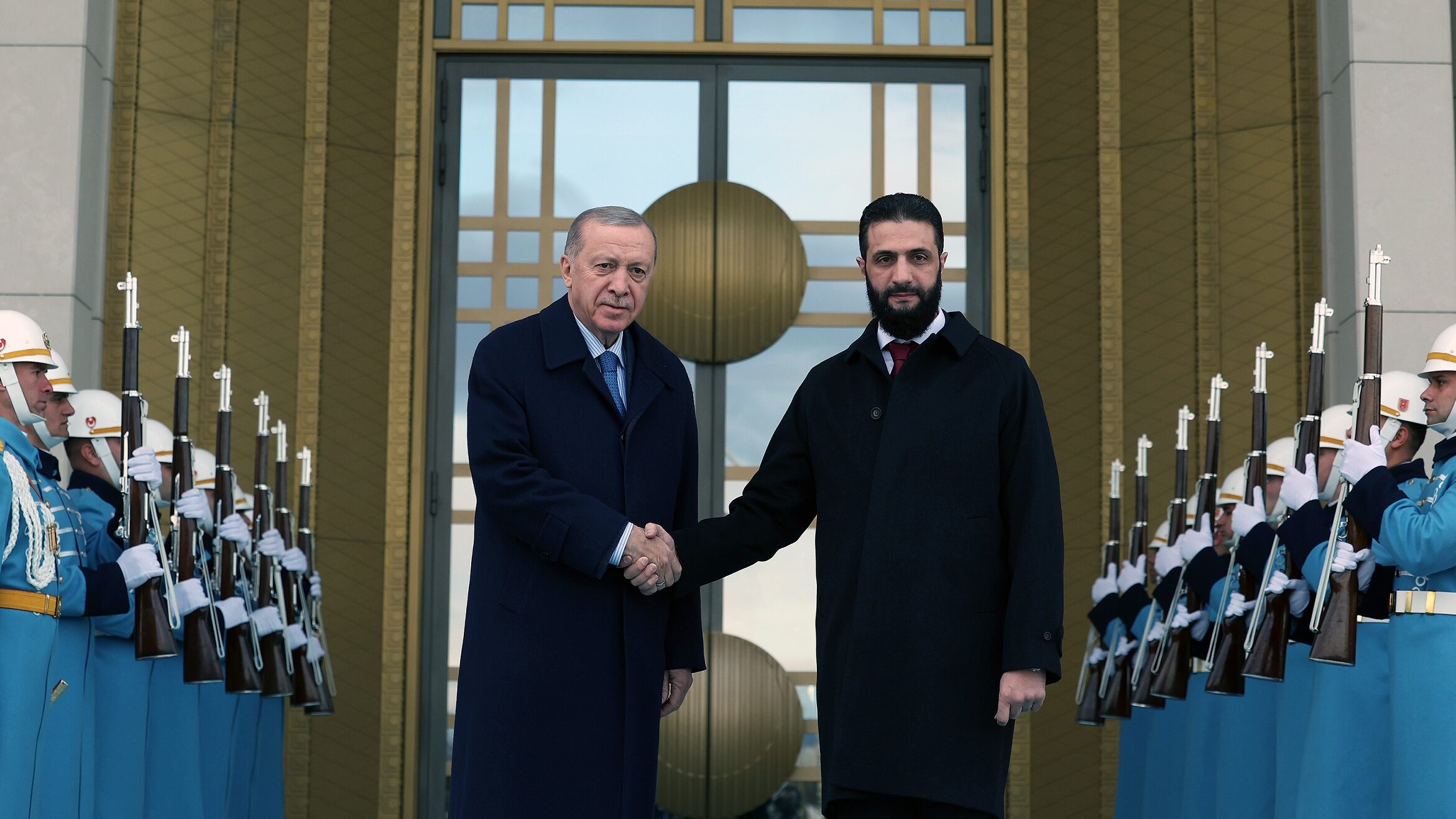Syrian Interim President Ahmed al-Sharaa Concludes Landmark Visit to Turkey
[Damascus] Syrian Interim President Ahmed al-Sharaa last week completed an official visit to Turkey, where he engaged in high-level discussions with President Recep Tayyip Erdoğan and senior Turkish officials. The visit, which captured widespread official and public attention, saw Turkish streets adorned with images of al-Sharaa, the Syrian flag, and banners welcoming the delegation in Arabic.
This trip marks al-Sharaa’s second foreign visit following his diplomatic engagement in Saudi Arabia and represents the highest-level official meeting between Syria and Turkey since 2009. Reactions to the visit were mixed, ranging from cautious optimism to skepticism about the evolving relationship between the two nations.
A notable moment from the visit was the presence of Latifa al-Droubi, al-Sharaa’s wife, who was photographed alongside Turkey’s first lady, Emine Erdoğan.
Key Discussions on Security and Military Cooperation
On Tuesday, al-Sharaa and Erdoğan held a closed-door meeting in Ankara, focusing on a joint defense agreement that includes the establishment of Turkish military bases in central Syria and the training of a new Syrian army. The discussions also addressed Israeli activities in southern Syria.
Among other pressing issues, the leaders explored strategies to resolve the Kurdish question, combat ISIS, and manage the nearly three million Syrian refugees currently residing in Turkey.
During a press conference in Ankara, al-Sharaa emphasized the importance of a “strategic partnership” with Turkey to counter security threats and ensure regional stability. He also extended an invitation to Erdoğan to visit Damascus in the near future.
Al-Sharaa underscored the historical and geographical ties between Syria and Turkey, stating that the Syrian revolution and Turkish engagement had strengthened these bonds. The meeting also delved into economic cooperation, with Turkish transportation and manufacturing companies showing interest in expanding operations in Syria, potentially tripling their current business activities.
Give the gift of hope
We practice what we preach:
accurate, fearless journalism. But we can't do it alone.
- On the ground in Gaza, Syria, Israel, Egypt, Pakistan, and more
- Our program trained more than 100 journalists
- Calling out fake news and reporting real facts
- On the ground in Gaza, Syria, Israel, Egypt, Pakistan, and more
- Our program trained more than 100 journalists
- Calling out fake news and reporting real facts
Join us.
Support The Media Line. Save democracy.


Calls for International Pressure on Israel
Al-Sharaa called on Erdoğan to apply international pressure on Israel to withdraw from the buffer zone in southern Syria and to enforce the terms of the 1974 Disengagement Agreement. This agreement, brokered by the United Nations following the 1973 October War, established a demilitarized buffer zone between Israeli and Syrian forces, with the United Nations Disengagement Observer Force (UNDOF) responsible for monitoring compliance and maintaining stability in the area.
The 1974 agreement delineated two key demarcation lines: the Alpha Line, marking the Israeli-controlled side, and the Bravo Line, defining the Syrian-controlled area. Between these lines lies a narrow strip of land designated as the buffer zone, where military activity is strictly prohibited. UNDOF, stationed within this zone, oversees troop movements, enforces ceasefire terms, and facilitates communication between both sides to prevent hostilities from escalating.
In December, Israeli Defense Minister Israel Katz ordered the expansion of the buffer zone, declaring it a weapons-free area. Al-Sharaa criticized this move, arguing that Israel had encroached into the demilitarized zone under the pretext of countering Iranian militias—a justification he dismissed as obsolete given the recent stabilization of Damascus.
Since the fall of former President Bashar Assad, Israel has acted swiftly to consolidate control over parts of the buffer zone. This marks the most significant territorial shift in the region in five decades, occurring with little international or UN intervention, raising concerns about the long-term implications for regional security and the future of UNDOF’s mandate.
Turkey’s Stance on Terrorism and Kurdish Militants
President Erdoğan reaffirmed Turkey’s commitment to supporting Syria in the fight against terrorism, particularly against ISIS and the Kurdistan Workers’ Party (PKK). He emphasized the need for decisive action against Kurdish militants in northeastern Syria, hinting at the return of hundreds of thousands of Syrian refugees as stability improves.
Erdoğan also reiterated Turkey’s support for lifting international sanctions imposed on Syria during Bashar Assad’s regime. He expressed Ankara’s interest in strengthening bilateral relations in trade, energy, civil aviation, healthcare, and education.
The Turkish leader urged Arab and Islamic nations to support Syria’s transitional government, noting that Ankara and Damascus had reached a consensus on several key issues. Praising the resilience of the Syrian people, Erdoğan stated, “We did not abandon our Syrian brothers in their darkest days, and we will continue to stand by them in this new phase.”
Uncertainty Over Future Military Operations
Despite ongoing discussions between al-Sharaa and the Syrian Democratic Forces (SDF) regarding the possible handover of arms to the Ministry of Defense, Turkey remains firm in its warnings about launching military operations in Syria to neutralize perceived security threats.
The high-profile visit and behind-the-scenes negotiations signaled a strategic realignment between Syria and Turkey. However, the future of the SDF and the likelihood of Turkish military action remain unresolved, with neither Ankara nor Damascus ruling out the possibility of escalation.
A Turning Point in Syrian-Turkish Relations
Turkey severed diplomatic ties with Syria in 2011 following the outbreak of the Syrian revolution, during which Ankara supported opposition forces against Bashar Assad’s regime. Now, with al-Sharaa at the helm of Syria’s transitional government, his historic visit to Turkey may herald a new phase in the complex relationship between the two neighboring countries.

